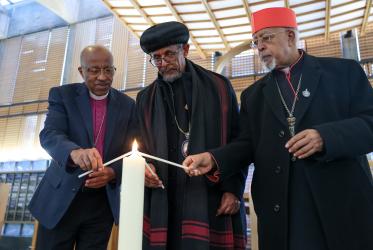One of the most well known and remarkable personalities in the history of the ecumenical movement is Rev. Dr Martin Luther King Jr. His name is forever carved into world history and into the history of the churches’ witness in the world. Today, 50 years after his assassination, he is honoured, and he is inspiring the churches worldwide to continue the work he was leading. His message should be both guiding us and disturbing us.
The ecumenical movement is a movement of churches and people moving together. The walk together towards our common goals has got new dimensions as we call one another for a Pilgrimage of Justice and Peace. Sometimes this movement, this pilgrimage, has to be a march confronting the harsh reality of the world. Rev. Dr Martin Luther King Jr became a leader of these marches towards a common goal of justice for all. The marches were confronting the many dimensions of racism in the American society; in the legislation, the practices, and the attitudes. The march was not finished by his death, neither in the USA nor in other parts of the world.
The assassination of Dr King did not kill his message. Rather, it gave new power and strength to the work to combat racism. His spirit continued and continues to work among us. The ecumenical movement became forever changed by his messages and the marches he was leading when he was living, and it was forever changed by the martyrdom he suffered. The World Council of Churches established the Program to Combat Racism, one of the most significant initiatives in the 70 years of its history. It became the common way to address for example the Apartheid system in South Africa.
There are strong dividing forces operating in the world today, and racism is part of the problem in many conflicts. On this April 4 we are as a world fellowship of churches honouring the legacy of Dr King together with our sisters and brothers in the USA. His message and his sacrifice is needed as 50 years ago, in the USA as in many other parts of the world.
One of the reasons for the churches to continue the march 50 years after April 4, 1968, is that the churches are also living in complicity with the reality of racism, in old and new forms. In the ecumenical movement we are facing one another in mutual accountability to see more clearly who we are and to hear more clearly what the Spirit calls us to change.
The assassination of Dr King was one of the first “world events” I can remember as a young boy. It was a shock to learn what it meant. A righteous man was killed for his work for justice. The preacher, the prophet, the Nobel Peace Prize laureate was shot and dead. It was a moment of understanding the real world, but also to get to know the leaders to follow to change the world.
May this day be another wakeup call, to see what it means that we all are created in the image of God.
Rev. Dr. Olav Fykse Tveit,
General Secretary of the World Council of Churches






